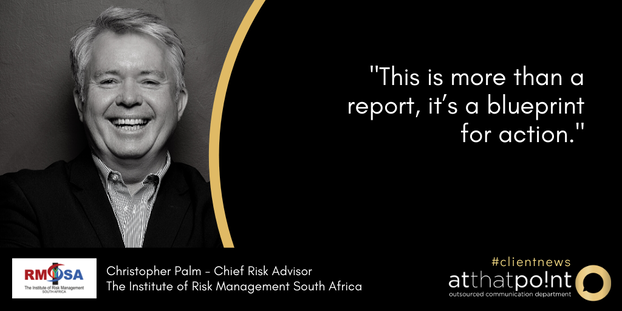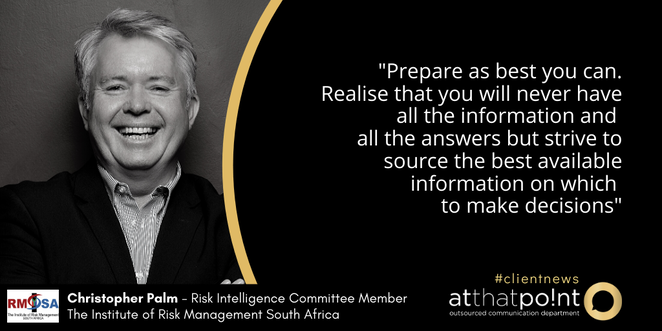|
The Institute of Risk Management South Africa (IRMSA) has launched its sixth annual risk report, the IRMSA Risk Report SOUTH AFRICA RISKS 2020.
“Our report takes a somewhat different form this year. We conducted a robust “look-back” analysis of the risks included in our risk reports for the last five years (2015 to 2019) providing insights into the reasons for the majority of those risks materialising in this time and highlighting the new skills and new ways of thinking required for effectively responding to risks in these socio-technical, socio-ecological, and socio-economic systems. We also evaluated key current developments and forward-looking views and considered the scenarios of our experts. In light of the complex set of risks facing the country, we took an integrated look at what is required to build a risk and resilient country within the context of the three possible IRMSA scenarios,” says Christopher Palm, Chief Risk Advisor at IRMSA. IRMSA’s analysis took into account the scenarios of three respected scenario planners—Indlulamithi, Clem Sunter and Frans Cronje. All four scenarios paint a similar picture, with three broadly similar possible scenarios. They are: Perpetual Hangover, which essentially involves continuing as we are; Fake It Till We Make it…Or Not, characterised by lofty goals that are not backed up by taking the hard decisions; and Spring of Hope, which relies on all South Africans taking individual and collective control to build a new national consensus. “The report then goes on to identify the top 12 risks and what actions need to be taken to support positive outcomes. We hope that this approach will help leadership in both the public and private sectors, risk practitioners and the public at large to conceptualise not only the risks we face, but also what the consequences of our decisions will be.” IRMSA research polled 585 risk experts and decision-makers across multiple industries in both the public and private sectors to investigate the top risks. From these conversations, the cross-cutting concern that emerged relates to our country’s ability to deliver on mega projects, in a sustainable manner. In this regard, three themes were highlighted:
The report identifies risk treatment options to be taken for each of these risks. IRMSA Risk Report 2020 also includes an assessment of skills needed by risk professionals, and the initiatives the Institute is taking to help upskill the industry to meet the challenge. “The final section of the report features advice from leading South Africans as to how we can all work together to turn things around, and make the Spring of Hope scenario a reality,” Mr Palm says in conclusion. “This is more than a report, it’s a blueprint for action.” Follow this link for the full Risk Report eBook: https://files.irmsa-techlibrary.org.za/riskreport2020/ ENDS MEDIA CONTACT: Rosa-Mari, 060 995 6277, [email protected], www.atthatpoint.co.za For more information on IRMSA please visit: Website: https://www.irmsa.org.za/ Twitter: https://twitter.com/IRMSAInsight Facebook: https://www.facebook.com/IRMSAInsight/?ref=hl LinkedIn: https://www.linkedin.com/company/irmsa-institute-of-risk-management-sa/
0 Comments
On 30 January 2020, the Director-General of the World Health Organisation (WHO) declared that the outbreak of the novel coronavirus (“2019-nCoV”) constitutes a Public Health Emergency of International Concern (PHEIC) and issued advice as Temporary Recommendations (TR) under the International Health Regulations (IHR).
The full report can be found here Since then there has been an upsurge in the news cycle and a plethora of news, both trustworthy and fake. What is a business leader or a risk manager to do? Firstly, recognise and state the risk as it could materialise in your organisation: For example: Staff may become infected by the novel corona virus which could lead to the death of a number of staff caused by management complacency, ineffective preventative measures and the lack of a preparedness and response plan, which may lead to the mandatory suspension of business operations as the offices of are sealed by national health authorities and the military, as a containment measure to mitigate the spread of the virus. Secondly, prepare as best you can. Realise that you will never have all the information and all the answers but strive to source the best available information on which to make decisions. The call to action from the IRMSA Risk Intelligence Committee is as follows: 1.Don’t panic but don’t be complacent. Get prepared! 2. Inform yourself accurately so that you can accurately inform and advise others. 3. Prepare a Pandemic Preparedness Plan (PPP) for your organisation. You could dust off and update an old PPP previously prepared for YOUR organisation but be thorough and do more than change the name of the virus and the date! Update the PPP using the best available information based on your diligent research and study of trusted resources. If you do not have a PPP, now is the time to prepare one and include it in your organisation’s business continuity management framework. Your organisation’s PPP is the core instrument to responsibly guide your organisation to PREVENT an outbreak and to REACT should a suspected case emerge in your organisation. 4. Constitute a “Corona Group” chaired by the CEO or a duly delegated and empowered alternate with the authority to make quick decisions. Staff the “Corona Group” with as few as possible but as many as necessary members committed to taking responsibility, allocating the time, and doing the work necessary to effectively develop and execute the PPP. The “Corona Group” should define the triggers that will activate specific actions by your organisation as and when they occur. 5. Stay up to date by following a few trusted sources. Fake news thrives in times like this; don’t fall into the trap. A few resources for you to consider are referenced below: https://www.who.int/health-topics/coronavirus Advice for the public – here you will find downloadable communication posters and other resources for you to print and post in the workplace. Situation reports – these will help to keep you up to date with concise information. Yes, it does not update as often as the mainstream news cycle, but it is based on more reliable information. Remember mainstream news sites are there to sell advertising space and to keep you hooked on every new snippet of news that comes along. Remember, sensationalism sells! Media resources – here you will find audio updates and transcripts to study for yourself what was said vs. how it is reported in the media. Technical guidance – here you will find guidance by topic: country readiness, patient management, risk communication and community engagement, and six other topics. There are also downloadable technical guidance publications covering all the above topics. Travel advice – here you will find updates on WHO advice for international traffic specifically in relation to the outbreak of the novel coronavirus. Follow two trustworthy news sites – limit it to one local and one international site. Follow www.irmsa.org.za to keep up to date with practical advice on how to manage this risk. ENDS MEDIA CONTACT: Rosa-Mari, 060 995 6277, [email protected], www.atthatpoint.co.za For more information on IRMSA please visit: Website: https://www.irmsa.org.za/ Twitter: https://twitter.com/IRMSAInsight Facebook: https://www.facebook.com/IRMSAInsight/?ref=hl LinkedIn: https://www.linkedin.com/company/irmsa-institute-of-risk-management-sa/ |
Welcome to the IRMSA Newsroom
Archives
December 2020
Categories
All
|



 RSS Feed
RSS Feed